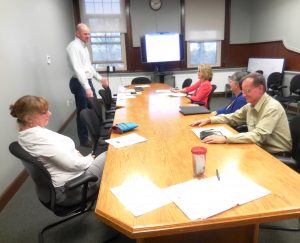
Peter J. Miller, Westfield director of community development, reviewed the CDBG FY17 Action Plan at the end of the public comment period Thursday. (Photon by Amy Porter)
WESTFIELD – A handful of people attended the public hearing Thursday to comment on the Community Development Block Grant (CDBG) Action Plan for FY 2017 (July 1, 2017 to June 30, 2018).
Peter J. Miller, the city’s director of community development, gave an overview of the city’s plans based on level funding of $323,448, plus a contingency plan containing a 30% cut in the allocation to $226,413, per HUD (Housing and Urban Development) instructions.
Miller said that President Trump has filed a “Build the Wall” supplemental, part of which was to eliminate CDBG in FY17. “I anticipate that we’re going to be level funded. We’ll see where this all goes. Additional cuts will be felt for sure,” Miller said.
Even with level funding, the city’s program income is down from what it has been in the past. Miller said that the past couple of years the city received program income of several hundred thousand when The Mill at Crane Pond and General Shepard Apartments refinanced and repaid CDBG loans, increasing the amount of money available.
The current year program income is $7,500, plus a carryover from the previous year of $110,000, for a total available with a level funding allocation of $440,948 for FY17.
The hardest hit in either scenario are the public services funded by the CDBG money. Public services are capped at 15% of the total, and nine programs are slated to divide $48,500, or in the contingency plan, $33,962. Over the past couple of years, a cap of $78,000 was divided among eleven programs.
The programs receiving the smaller grants this year include the Boys & Girls Club Kidscape, Kamp for Kids, Domus Hi-Set (GED instruction), Greater Westfield Committee for the Homeless, Westfield Food Pantry, Meals on Wheels, Westfield Thom Playgroup, Westfield COA Companionship Program, the Soup Kitchen, Westfield YMCA Transportation for after-school programs, and YWCA New Beginnings, for victims of domestic violence.
Planning and administration of the CDBG funds is set at $64,689 at level funding, and $45,282 in the contingency plan. A portion of Miller’s salary is paid through this funding.
Economic development is slated to receive $70,000. Miller said that businesses with five or less employees, or companies with greater than five employees but who could create a job for a lower-middle income employee are eligible in this category. The city plans to provide assistance to businesses locating in storefronts that have been vacant for six months or more, and plan to assist three businesses with the grant. If the contingency plan goes into effect, that grant will be reduced to $54,000.
The higher priority in the action plan this year is in public infrastructure, listed under community facilities, and a housing improvement program, which is being offered for the first time in seven years.
The $110,000 in public infrastructure will be used for neighborhood improvements in the eligible lower-income districts, which are mostly surrounding the hospital and the riverfront areas. Miller said the program has had its biggest benefits in redoing sidewalks and curbing, and are looking at doing the same this year. He said he will work with engineering and public works to determine which streets to work on.
The home improvement program will be funded at $100,000. Miller said the deadline for the program was last Friday, and that he received 25 applications, 18 of which have been preliminarily screened as eligible. He said the program currently has enough money to do work on four homes, and new funding will allow them to do four additional homes. A lottery will be held on May 4 to draw names from eligible entries.
“When we had a lot more money in the 90’s, we did a couple of hundred home improvements,” Miller said. He added that he is excited about bringing back the program. Neither infrastructure improvements nor housing will be cut in the contingency plan.
The last area of funding is spot blight removal, which was given a $45,000 allocation in the action plan and $0 in the contingency plan. Miller said the city is considering assisting the Westfield Redevelopment Authority with the demolition of the bowling alley, which they just purchased, or painting a couple of buildings on Elm Street.
Miller said that only one comment was received on the action plan during the 30 day comment period, and that came from the mayor and the police department with a request that some money be allocated for zoning and sanitary code enforcement. Miller said that will be considered, and if allocated would likely come from the infrastructure and spot blight removal funding.
Miller then opened the floor to comments from those present at the meeting.
Alice Flyte suggested that CDBG funds be used for access ramps to the Columbia Greenway Rail Trail in the riverfront area. She said since the trail crosses those neighborhoods, it would be important to allow access to it.
Miller said the challenge would be the regulations relative to the levee system. He said the ramps would have to be designed with the FEMA levees in mind.
Flyte also said that restrooms in the public park planned for the riverside would be a good investment.
Miller said the restrictions on the program require that improvements benefit low to moderate income neighborhoods. He said the ramps would be a direct benefit, whereas the public restrooms would be a citywide benefit.
The public comment period on the action plan ends Friday at 4 p.m. Miller said he expects to hear about the city’s allocation in the next couple of weeks, depending on what happens in the U.S. House of Representatives.

